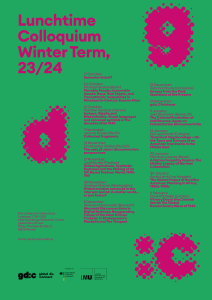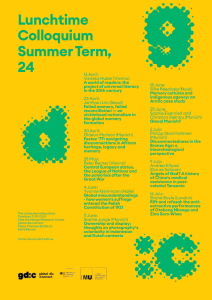In
Past events
Opening conference at Zentralinstitut für Kunstgeschichte Munich, 9 February 2024, 15:00, the exhibition will last until 5 April, free entry
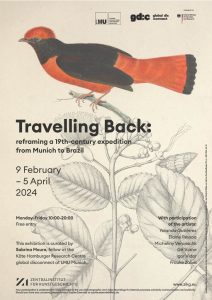 Travelling Back presents a critical perspective on the narratives and collections Bavarian scientists Johann Baptist von Spix (1781–1826) and Carl Friedrich Philipp von Martius (1794–1868) brought from Brazil to Munich in the 19th century. The exhibition follows their extensive three-year journey across the Brazilian hinterland, including the Amazonian region.
Travelling Back presents a critical perspective on the narratives and collections Bavarian scientists Johann Baptist von Spix (1781–1826) and Carl Friedrich Philipp von Martius (1794–1868) brought from Brazil to Munich in the 19th century. The exhibition follows their extensive three-year journey across the Brazilian hinterland, including the Amazonian region.
Spanning 14 000 km, this expedition took place from 1817 to 1820 and was later chronicled in the multi-volume publication Reise in Brasilien (Travels in Brazil – 1823), providing a personal account of the scientists' encounters and perceptions of the country's varied landscapes, cultures and wildlife.
During their travels, Spix and Martius interacted with various indigenous groups and gathered numerous ethnographic, botanical and zoological specimens. These materials became foundational for several Bavarian institutions, like the Bavarian State Collections of Zoology and Botany, as well as the Königlich Ethnographische Sammlung, now the Museum Fünf Kontinente, established in 1862. Beyond tangible artifacts, these collections also treat the history of Isabella Miranha and Johann Juri, two indigenous children brought to Munich in 1820, who died tragically soon after their arrival. Unlike the scientists' evident presence in the city's landscape, the history of these children is marked by silences and absences in public memorial spaces.
The exhibition raises crucial questions about the coloniality underpinning the scientific pursuits of the natural-history project between Munich and Brazil in the 19th century. It examines the various displays and interpretations of Spix and Martius's collections from their arrival in Germany to the present, and it sheds light on the dis:connectivities of knowledge production behind these scientific endeavours. The idea is not only to inquire into the public reception of these experiences through a history of the gaze, but also to draw a critical examination through the lenses of present-day dialogues and initiatives. This includes new scientific practices of knowledge restitution, literary interpretations and contemporary perspectives from artists like Micheliny Verunschk (Brazil), Frauke Zabel (Germany), Yolanda Gutiérrez (Germany/ Mexico), Igor Vidor (Brazil), Elaine Pessoa (Brazil) and Gê Viana (Brazil).
Curator: Sabrina Moura, fellow at Käte Hamburger Research Centre global dis:connect
Please click
here to download the programme of the opening conference.
Continue Reading
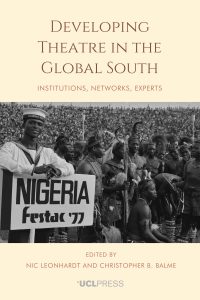 Developing Theatre in the Global South
Developing Theatre in the Global South





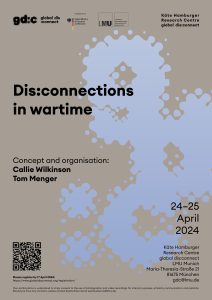 Perhaps nothing demonstrates the complexities of globalisation more clearly than war. The international reverberations of Russia’s invasion of Ukraine have painfully exposed the interconnected nature of modern economies and our vulnerability to forces beyond our control, prompting anxious speculations about deglobalisation. Yet, experts agree that the more likely outcome is not isolation, but instead, changing geographies of connection. Similarly, recent historical scholarship has complicated conventional understandings of war as a dividing force, instead emphasizing both the connections and disconnections that it brings in its wake. In wartime, enemies are dehumanised in government propaganda, travel is disrupted, and trade blockades are enforced.
Wartime is associated with absences, interruptions, and detours, as lives are lost, scientific exchanges are cut off, and mobilized populations find themselves transported far from home. Yet, war can also create new spaces of interaction and encounter, sometimes across enemy lines. Some of these exchanges are illicit, such as smugglers who evade military blockades, or spies who penetrate enemy territory. Others are more overt, between prisoners of war and their captors, or surgeons who treat enemy combatants. War can provide the impetus for new connections and the widening of geographical horizons in the pursuit of resources, sometimes with lasting consequences. War, in other words, is the optimal lens through which to trace global connections and disconnections.
Perhaps nothing demonstrates the complexities of globalisation more clearly than war. The international reverberations of Russia’s invasion of Ukraine have painfully exposed the interconnected nature of modern economies and our vulnerability to forces beyond our control, prompting anxious speculations about deglobalisation. Yet, experts agree that the more likely outcome is not isolation, but instead, changing geographies of connection. Similarly, recent historical scholarship has complicated conventional understandings of war as a dividing force, instead emphasizing both the connections and disconnections that it brings in its wake. In wartime, enemies are dehumanised in government propaganda, travel is disrupted, and trade blockades are enforced.
Wartime is associated with absences, interruptions, and detours, as lives are lost, scientific exchanges are cut off, and mobilized populations find themselves transported far from home. Yet, war can also create new spaces of interaction and encounter, sometimes across enemy lines. Some of these exchanges are illicit, such as smugglers who evade military blockades, or spies who penetrate enemy territory. Others are more overt, between prisoners of war and their captors, or surgeons who treat enemy combatants. War can provide the impetus for new connections and the widening of geographical horizons in the pursuit of resources, sometimes with lasting consequences. War, in other words, is the optimal lens through which to trace global connections and disconnections.
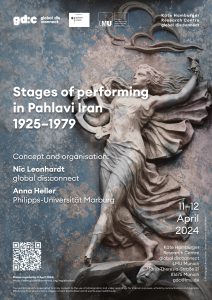
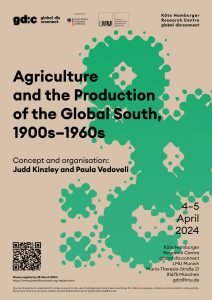 Workshop at the Käte Hamburger Research Centre global dis:connect, LMU Munich
4-5 April 2024
The importance of agriculture and extractive industries to the making of the Global South in the 20th century has been obfuscated by the resonance of modernisation theory, dependency theory and development economics since the Second World War. With this workshop, themed Agriculture and the production of the Global South, 1900s-1960s, we seek to move beyond the rigid dualism of postwar models of growth and development by excavating processes and trajectories in the Global South and Global North that reveal the importance of agriculture and extractive production to the making of our contemporary world.
Organisers: Paula Vedoveli, Judd Kinzley
Please click
Workshop at the Käte Hamburger Research Centre global dis:connect, LMU Munich
4-5 April 2024
The importance of agriculture and extractive industries to the making of the Global South in the 20th century has been obfuscated by the resonance of modernisation theory, dependency theory and development economics since the Second World War. With this workshop, themed Agriculture and the production of the Global South, 1900s-1960s, we seek to move beyond the rigid dualism of postwar models of growth and development by excavating processes and trajectories in the Global South and Global North that reveal the importance of agriculture and extractive production to the making of our contemporary world.
Organisers: Paula Vedoveli, Judd Kinzley
Please click  Travelling Back presents a critical perspective on the narratives and collections Bavarian scientists Johann Baptist von Spix (1781–1826) and Carl Friedrich Philipp von Martius (1794–1868) brought from Brazil to Munich in the 19th century. The exhibition follows their extensive three-year journey across the Brazilian hinterland, including the Amazonian region.
Travelling Back presents a critical perspective on the narratives and collections Bavarian scientists Johann Baptist von Spix (1781–1826) and Carl Friedrich Philipp von Martius (1794–1868) brought from Brazil to Munich in the 19th century. The exhibition follows their extensive three-year journey across the Brazilian hinterland, including the Amazonian region.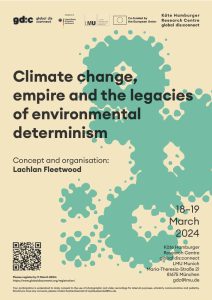 We live in a time when concern about human effects on the environment and climate are greater than ever. For much of human history, however, the opposite was true, and environments’ and climates’ effects on people were often the more pressing concern. Environmental or climatic determinism – the idea that people are shaped physically, culturally and even morally – by their environments has a long and often insidious history.
We live in a time when concern about human effects on the environment and climate are greater than ever. For much of human history, however, the opposite was true, and environments’ and climates’ effects on people were often the more pressing concern. Environmental or climatic determinism – the idea that people are shaped physically, culturally and even morally – by their environments has a long and often insidious history.